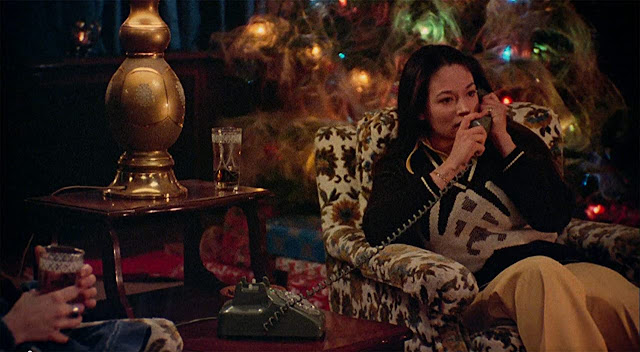PHENOMENALITY: *uncanny*
MYTHICITY: *fair*
FRYEAN MYTHOS: *drama*
CAMPBELLIAN FUNCTION: *psychological*
Director Bob Clark's BLACK CHRISTMAS is one of those popular horror movies whose technique I can admire even though it doesn't reach me emotionally. For some time, I couldn't figure out how to approach it critically.
Then, on my most recent re-watch, I realized that the main element of the story-- a psycho who sneaks into a sorority house at Christmas-time to kill the occupants-- is given a deeper vraisemblance than most of the later slashers by the nature of the murderer's victims. Though only the character of Barb (Margot Kidder) goes out of her way to fill her speech with expletives, there are frequent reminders, even in the person of the mature house-mother, that modern young women are no longer innocent little flowers. There had been a number of prominent mainstream films with lots of adult language since the institution of the ratings system in the late 1960s, but few if any had focused so intensely on female potty-mouths.
In an odd way, the psycho is a more extreme case of unrestrained speech, for he first intrudes on the sorority sisters with "heavy breathing" telephone calls, in which he either crudely insults the women or mocks them with phony voices. Whether or not such callers abused telephone technology in earlier decades, the seventies seems to be the era in which the practice of obscene phone calls became a dubious part of the American cultural underbelly.
It's thus no coincidence that while the psycho preys on his victims, viewpoint character Jess (Olivia Hussey) has a falling out with her boyfriend (Keir Dullea) because she's become pregnant and plans to abort the child. Jess, while presented as a sympathetic character, has no motive to seek the abortion except that she doesn't want to marry Peter and feels that having a child would inhibit her career goals. Since her decision is presented in such a matter-of-fact manner, the script doesn't make a strong case for or against abortion as such, and so the topic seems to have been raised to contribute to an overall sense of anomie.
CHRISTMAS is a tense film but as I said, not deeply involving. The killer applies the name "Billy" to himself and speaks of a forbidden encounter with someone named Agnes. I tend to doubt that the writer meant to encode any strong meaning in these fragmentary revelations, though Hitchcock's PSYCHO could have influenced the writer's approach to the material. I've heard that the 2006 reworking builds up the psycho's backstory, though none of the remakes have attained the cult status of Clark's movie. Oddly enough, he also directed another Yuletide film that had precisely the opposite effect to this one's ironic posture-- even though the 1983 CHRISTMAS STORY worked in a certain amount of "cussing" as well.

No comments:
Post a Comment